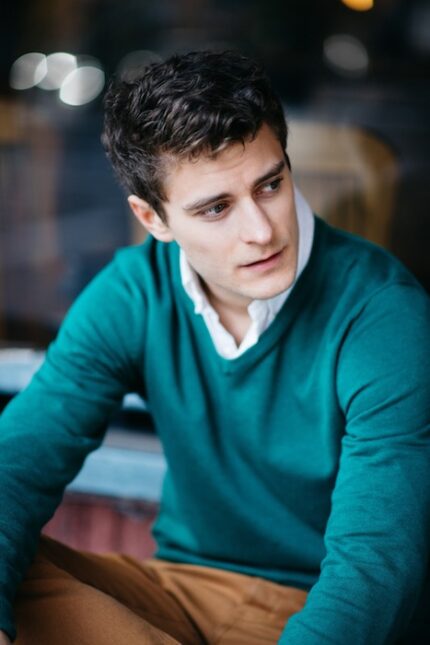Countertenor’s subtle artistry provides the highlights in uneven MOB program

Monday night’s concert by Music of the Baroque at the Harris Theater, titled “Vocal Concertos,” had a promising program. A Vivaldi concerto, solo showpieces by Handel and Vivaldi for soprano Sherezade Panthaki and countertenor Jakub Józef Orliński, and the gorgeous and underplayed Pergolsei Stabat Mater. Unfortunately, the performances didn’t always live up to the program’s potential.
Notwithstanding the program title, the concert opened with the only actual concerto: Vivaldi’s Violin Concerto “for the Most Holy Assumption of the Virgin Mary,” with MOB concertmaster Gina DiBello serving as the soloist.
Before the concert began, guest conductor Paul Agnew explained that he had (seemingly rather last-minute) decided to step back and let DiBello conduct the concerto herself.
She was not entirely successful in this role. She started things well with her variations of tempo in the Adagio introduction warding off any potential stodginess. But once the Allegro proper got underway, it became clear that no one was actually driving the bus. Vivaldi peppered his concerto with lots of surprise dissonances, expressive sighing figures, and sprightly dance rhythms. The orchestra drove right over these elements, without any suggestion that any of them might be special.
None of these flaws marred DiBello’s playing of the solo part, which was anything but mechanical. She phrased with a great variety of character and was not afraid to execute multiple rapid tempo shifts within a single passage, whenever she had enough independence from the orchestra to do so.
The rest of the first half offered one solo piece each for the evening’s two soloists.
Panthaki’s was Handel’s setting of the Salve Regina. Her technique was secure, but her phrasing of the opening sections was hyper-emotional, sometimes to the point of being overwrought, with barely a note spared some kind of expressive effect.
This would have been simply too much had she maintained this approach for the whole piece. But she was smart enough not to. Handel’s setting of the “Eja ergo advocata nostra” is a frisky bit of major-key fun, to which she brought the requisite playfulness. And she rendered the closing with a serene, unclouded tone. This all lent a sense of narrative progression: from sobbing to joy to peace.
Orliński could not have differed more from Panthaki in timbre or in the approach to his performance, in Vivaldi’s Nisi Dominus. Whereas she had throbbed, he pealed. His tone had a rosy bloom, his passagework was clean, and his top was free from any harshness.
Rather than phrasing with great surges of sentiment, Orliński made his expressive points subtly, often with astute control of diction. His slight laboring of the word “frustra” (in vain) in the opening section aptly suggested struggle. His “Surgite” (calling for the congregation to rise up) had the tone of a parent chiding a truant child.
Throughout all of these proceedings, the main liability was the orchestra, which frequently played sloppily under Agnew’s direction. In the organ obbligato of the Handel, Stephen Alltop scrambled to keep up, flubbing many notes along the way.
Much of the evening’s problems had to lay with the conductor. Visually, Paul Agnew’s conducting was arresting. The shapes he carved with his baton suggested myriad inflections of dynamics and articulation. But these gestures never seemed to reach the players’ hands or the audience’s ears. The orchestra trudged from one note to the next, with virtually no differentiation between them.
All of these trends converged in the final piece of the program, Pergolesi’s Stabat Mater. This underrated masterpiece should have been the crown jewel of the program.
Panthaki brought the same heaving approach to almost all of her solos, until they merged into one. And in many of the duets, the gulf between the two singers’ styles was simply too large. The “Quis est homo, qui non fleret” sounded like two different performances at once: his in an intimate chapel, and hers in a sprawling opera house.
The performance was not without its finer moments. All of Orliński’s solos were causes for joy, tender and pliant. And the lightness of touch both singers brought to “Quando corpus morietur” was a welcome way to end the evening. But this was not quite enough to save the piece, or to erase the impression that the concert had been a very mixed affair.
Music of the Baroque will close the season with Nicholas Kraemer leading a program of Bach and Telemann 3 p.m. May 13 at the North Shore Center for the Performing Arts in Skokie and 7:3o p.m. May 14 at the Harris Theater. baroque.org
Posted in Performances


Posted Apr 24, 2018 at 5:24 pm by ChiLynne
Each to his own taste. To mine, this was a consistently gorgeous concert. What a privilege and delight to have been there!
Posted May 01, 2018 at 7:49 am by Dean Schroeder
I agree with ChiLynne…the concert was enthralling. Let’s have more of all participants in the future!